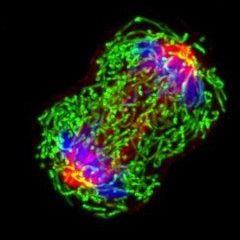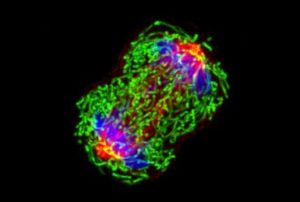Paul Yaswen of the Environmental Genomics & Systems Biology Division was part of a team of researchers from Berkeley Lab, UCSF, and the Buck Institute who co-authored an October 24 Nature Medicine publication on their research that showed the potential of PIM1 kinase inhibition for treatment of patients with triple-negative breast cancer (TNBC). TNBC, which lacks the expression of the estrogen, progesterone, and HER2 receptors, represents the breast cancer subtype with the poorest outcome. No targeted therapy is available against this subtype due to lack of validated molecular targets.
Their finding was the culmination of a years-long collaborative effort, lead by UCSF, that involved the use of normal human mammary epithelial cells engineered by Alexey Bazarov in Yaswen’s lab to express an inducible MYC oncogene – a gene that is frequently amplified and overexpressed in TNBC. Dai Horiuchi in Andrei Goga’s lab at UCSF subjected the cells to a synthetic lethality screen using shRNAs against all known kinases. Two genes are synthetic lethal if alteration of either alone is compatible with viability but alteration of both leads to death. Targeting a gene that is synthetic lethal to a cancer-relevant mutation such as MYC amplification should kill only cancer cells and spare normal cells. Using this approach, PIM1 – a targetable non-essential kinase – was identified.
Additional work by Goga’s team and other collaborating groups showed the relevance of the finding in clinical datasets and xenograft models. Small molecule PIM kinase inhibitors have already been identified and are available for clinical testing.
For more on this story, read the UCSF press release.





